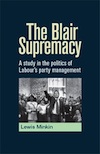The Blair Supremacy is a timely and important book, says SARAH PERRIGO, which shines a light on the causes of Labour’s current crisis and its election defeat last May.
Lewis MInkin is one of the most respected writers on the Labour Party. His previous books, The Labour Party Conference and The Contentious Alliance (on party union relationships) are meticulous explorations of the internal workings of the Labour Party, the ways in which power is exercised in the party, the ideological divisions and the struggles for power and influence. Those books helped us all understand better not just how the party worked but how policy, and political decisions were reached, and how conflict and dissent were dealt with.
 His new book takes his work onto new ground with its detailed exploration of the changed nature of the Labour Party organisation and ways of working from the 1990s with the development of ‘New Labour’ and the election of Tony Blair as leader.
His new book takes his work onto new ground with its detailed exploration of the changed nature of the Labour Party organisation and ways of working from the 1990s with the development of ‘New Labour’ and the election of Tony Blair as leader.
This is a really timely and important book, given the crisis the Labour Party is facing since the election defeat of May 2015. For those of us interested in the future of the Labour Party it is important to go back to the drawing board and ask searching questions about what the Labour Party stands for, what are its values and what does it want to achieve.
There has been a real failure in the Labour Party to re-evaluate the Blair/Brown years and their legacy. Despite the haemorrhaging of Labour members and the decreased support for the Labour Party in all elections after the success of 1997, and despite the defeat of Brown in the 2010 election, there was no serious evaluation of the New Labour project, where it led the party and why increasing numbers of people were disillusioned, losing any idea of what the party stood for.
Lewis’s does not deny some of New Labour’s achievements and the necessity to modernise the organisation and policy if Labour was to become electable again, having been out of power since 1979. Yet the book is a critical and trenchant indictment of the internal changes that occurred in party management and the dire consequences those changes had on party democracy, helping to undermine trust and confidence in political life.
Ruthless machine
The book explores in great detail how the party was transformed into a top-down, minutely controlled machine. It is important to remember that Blair came into office in 1997 promising to do politics differently: to open up the party and democratise it.
What actually happened, as Lewis details, was the opposite. The party went far beyond some professionalisation and media management to become a highly centralised, authoritarian and ruthless machine, controlled by a small elite of MPs, party officials and advisors for whom spin and manipulation in the name of party management became the norm.
The book shows the impact these changes had on the existing party structure and organisation: for example, the party conference, ostensibly the sovereign policy-making body, became a tightly managed vehicle for rubber stamping policy already decided by the elites and new policy forums whose decisions were dominated by small groups of cabinet members and party managers.
Despite the party’s official policy that Constituency Labour Parties should choose their MPs, candidates known to be loyal to Blair and his politics were parachuted in. Professional, highly educated men and women were often selected, many of whom had little experience of life outside of the Labour Party but displayed proven loyalty to the leadership. The number of MPs with working class or trade union backgrounds decreased markedly.
Although relations between party and members have always been problematic to some extent, the depth and scope of the changes that occurred made the division between party elites and the membership wider and wider. Members were treated with contempt, seen only as foot soldiers doing the bidding of their leaders.
I remember hearing Peter Mandelson in Leeds just before the 1997 election talkng about the generals and the troops – an apposite description of what was to come. Many left the party and those who stayed were increasingly critical.
It is in this context, following the suppression of dissent, the lack of democracy, the failure to even value party members, that we can perhaps understand the huge support given to Jeremy Corbyn for fundamental change.
After the election defeat in 2015 I wrote that that the Labour Party urgently needed a fundamental debate about its future. I was not alone. Many were asking what is the Labour Party for?
That debate has only just begun but the strength of Lewis Minkin’s book is that it allows us to understand how we got to where we are and how fundamental are the changes we need to make to the Party’s structure, organisation and policy-making processes if we are to offer a coherent, realistic but inspiring alternative to the present neo-conservative dominance of British politics.
—-
Sarah Perrigo is a former lecturer in Peace Studies at Bradford University. She has a special interest in human rights and gender politics.
 This is an edited version of a talk given at the Leeds launch of The Blair Supremacy in March 2016.
This is an edited version of a talk given at the Leeds launch of The Blair Supremacy in March 2016.
The Blair Supremacy: A study in the politics of Labour’s party management, by Lewis Minkin, is published by Manchester University Press. Priced £26.99 paperback. Click here for more information or to buy the book.
See also: ‘Blair, Management and Neoliberalism’ by Hugo Radice, and ‘Assessing the Blair Supremacy’ by Barry Winter.


